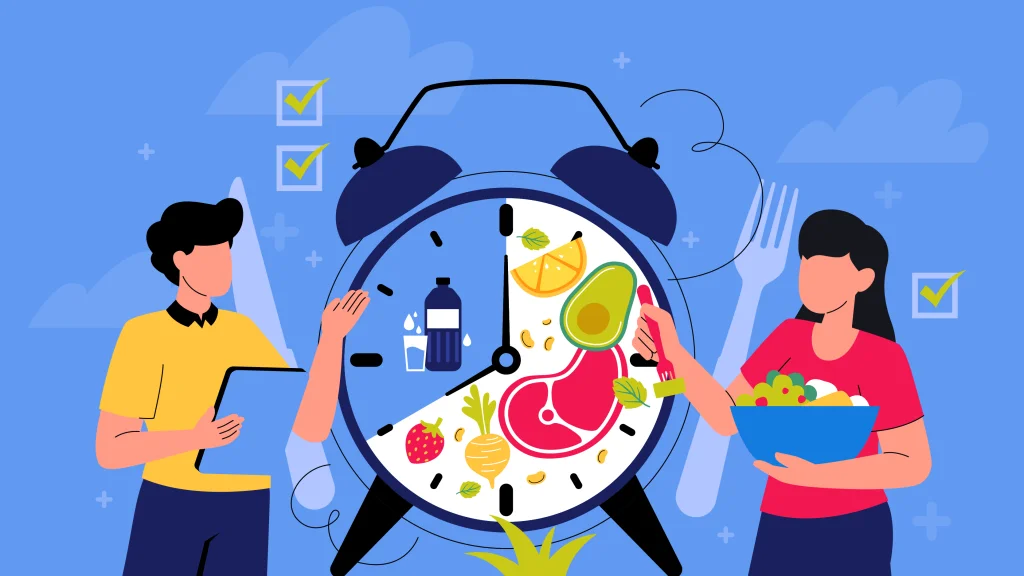
Introduction: Chrono-Nutrition : What is it?
The emerging discipline of Chrono-Nutrition highlights the complex interactions between our internal clocks and dietary habits at the nexus of circadian rhythms and dietary practices. Numerous physiological functions, such as hormone secretion, heart rate, and metabolic activity, are regulated by circadian rhythms, controlled by molecular oscillators during the day/night cycle. Stress and shift work are two modern elements that disturb natural cycles, resulting in a health risk that includes metabolic illnesses. When developing dietary interventions, nutrigenetics emphasizes even more how crucial it is to consider genetic polymorphisms in circadian-related genes.
Read More – The Digital Detox For Mental Well-Being
Dietary treatments continue to be crucial for the prevention and management of diabetes, a worldwide epidemic. The circadian clock also plays a function in metabolic regulation, impacting enzyme activity and glucose metabolism. With its emphasis on the influence of meal timing on glycemic control, chrono-nutrition is emerging as a critical factor in the treatment of diabetes. The increasing prevalence of diabetes makes it critical to comprehend the dynamic interplay among circadian rhythms, nutrition, and hereditary variables.
In navigating this complex terrain, this study clarifies potential nutritional methods for circadian-aligned meals and examines how disturbances in the molecular clock affect non-communicable diseases. All things considered, chrono-nutrition is a comprehensive strategy that maximizes health outcomes, especially when it comes to diabetes, by combining genetics, circadian biology, and dietary habits.
Circadian Rhythm
Circadian rhythms are complex biological cycles that modulate many physiological processes, including sleep, fasting, and metabolism. Peripheral clocks show diurnal oscillations even in isolation, and suprachiasmatic nuclei (SCN) in the brain and peripheral organs have coupled clock oscillators. Peripheral clock synchronization is essential for temporally coordinated physiology. Circadian stimuli cause the expression and release of variables that affect functional alterations, including body temperature, melatonin, cortisol, glucose tolerance, and sleep.
Clock genes, such as CLOCK, BMAL1, PER1, PER2, CRY1, and CRY2, orchestrate a transcriptional autoregulatory feedback loop that controls the circadian rhythm molecularly. Positive regulation of PER and CRY via CLOCK-BMAL1 activation results in the formation of a negative-feedback repressor complex, which governs circadian rhythmicity. SCF E3 ubiquitin ligase complexes and kinases such as AMPK and CK1ε/δ regulate the stability and degradation of PER and CRY proteins post-transcriptionally.
When looking at glucose metabolism from a chronobiological perspective, the day/night cycle is consistent with circadian fluctuations in glucose tolerance. Circadian oscillations are seen in hormones such as cortisol and insulin, and the circadian system is important for glucose metabolism. By altering the phase relationship between the central circadian pacemaker and peripheral oscillators in the liver and pancreas cells, disruptions such as irregular meal times can affect glucose metabolism. The SCN-driven timing of meals affects glucose metabolism by bringing peripheral tissues’ circadian rhythms into harmony. Chrononutrition plays a crucial role in circadian disruption and the development of metabolic diseases, such as type 2 diabetes, due to the complex interactions between circadian rhythms, meal timing, and nutrients.
Further discussed are the core principles of chrono-nutrition , examining the impact of circadian rhythms on metabolism, hormonal fluctuations, and the potential benefits of aligning eating habits with the body’s internal movements.
1. Metabolism: The significant impact circadian rhythms have on metabolic processes is one of their important features. Studies reveal that the body’s capacity to process nutrients changes during the day. For instance, increased insulin sensitivity in the morning tends to facilitate better glucose utilisation. On the other hand, evenings are linked to a reduction in insulin sensitivity, which may account for the rise in postprandial glucose levels seen with late-night meals.
2. Meal Timings and Hormonal Fluctuations
A. Control of Insulin and Glucose: Chrono-nutrition places a strong emphasis on the necessity of timing meals to correspond with the body’s innate insulin sensitivity. Eating larger meals earlier in the day may improve glucose homeostasis and lower the risk of metabolic diseases associated with insulin resistance.
B. The Wake-Rest Cycle and Cortisol: The hormone cortisol, which is linked to stress and alertness, has a circadian rhythm and peaks early in the morning to help you get through the day. According to chrono-nutrition, it may not be the best idea to eat high-energy foods and caffeinated beverages during the hours when cortisol levels are at their highest since this could disrupt the body’s normal waking cycle.
3. Chrono-Nutrition Strategies for Optimal Health
A. Breakfast as the Essential Meal: Choosing to follow the chrono-nutrition model and have a hearty breakfast is in line with good health. “Eating breakfast like a monarch” is a principle that promotes metabolic function and provides energy for the entire day.
B. Time Restricted Eating: Eating within a time window of eight to twelve hours a day helps to balance circadian cycles. This approach has the potential to improve insulin sensitivity, support overall metabolic health, and help with weight management.
C. Nighttime eating and weight: Chrono-nutrition advises against eating late at night because research reveals a link to weight gain. Reducing calories consumed in the evening may help maintain weight by counteracting the body’s decreased ability to digest nutrients at night.
4. Impact of Chrono-Nutrition on Specific Health Conditions
A. Disorders of Metabolism: Obesity, type 2 diabetes, and dyslipidemia are among the metabolic illnesses for which chrono-nutrition therapies, such as time-restricted eating, have shown promise. Meal timing that is in line with circadian cycles may improve insulin sensitivity and lipid profiles.
B. Issues with Sleep: Sleep disorders can be attributed to disruptions in circadian rhythms, which are frequently seen in shift workers or people with irregular sleep patterns. In addition to improving overall sleep quality, chrono-nutrition therapies may help control sleep-wake cycles.
5. Obstacles and Things to Talk About
A. Aspects of Culture and Lifestyle: It can be difficult to incorporate chrono-nutrition principles into everyday life, particularly in societies where meal scheduling is deeply ingrained in custom. A sophisticated strategy is needed to strike a balance between cultural customs and chrono-nutrition guidelines so that cultural values and health are upheld.
B. Variability by Individual: Although chrono-nutrition offers useful guidance, circadian rhythm variability varies among individuals. Naturally, “night owls” or “morning larks” may affect how well chrono-nutrition techniques work. It is imperative to customise recommendations based on particular chronotypes.
Conclusion
At the nexus of chronobiology and nutrition, chrono-nutrition provides a comprehensive approach to health by acknowledging the significant influence of circadian rhythms on hormone variations and metabolism. The secret to maximizing health and well-being may lie in incorporating chrono-nutrition concepts into our everyday lives as research on the complex relationship between our internal clocks and food patterns continues.
Read More – Health Benefits Of Asparagus
Adopting techniques like eating within a set time limit, making breakfast a priority, and cutting back on evening meals might enable people to better balance nutrition and circadian biology by enabling them to match their eating patterns with their bodies’ natural cycles. In the end, chrono-nutrition is a potentially effective way to support general vitality, prevent metabolic diseases, and promote health.
Read More – Laughter Ultimate Health Booster



